Dive Brief:
- In a new TeamBlind survey, 15% percent of tech workers said that a non-disclosure agreement (NDA) has "silenced me or my coworker(s) from speaking up about important issues."
- When Blind broke the results down by company, it found that Tesla had the highest percentage of employees who claimed to have been silenced, at 30%. Intel was next at 20.7%, followed by Amazon with 20.3%.
- NDAs often protect company information, but Blind said they're also sometimes used to keep employees from reporting workplace misconduct, including alleged sexual harassment. "These days, it’s not uncommon for NDAs to include a non-disparagement clause, which keeps employees from saying anything negative about the company or its executives, under the guise of protecting company secrets," Blind said.
Dive Insight:
At the center of much of the recent revelations about alleged sexual misconduct by company executives and high-profile celebrities are NDAs. These agreements reportedly have been used to keep people who claim they experienced or witnessed abuse from speaking up about it.
In a June U.S. Equal Employment Opportunity Commission (EEOC) hearing on confronting sexual harassment in the workplace, participants discussed whether NDAs and mandatory arbitration clauses encouraged sexual misconduct by essentially concealing it. Elizabeth Tippett, associate professor at the University of Oregon, said people won't use a system in which the other side has no accountability, describing NDAs and arbitration clauses. But lawyers representing employers said these agreements maintain confidentiality for the victim and help in arriving at a settlement.
Pennsylvania democratic lawmakers, led by Sen. Judy Schwank, introduced a bill in late 2017 to ban NDAs' use in sexual harassment cases. More states could follow Pennsylvania's lead, especially as the #MeToo movement continues to encourage claimants to come forward. As a result, more employers are reconsidering how and when they deploy NDAs. Uber, for example, recently opted to nix mandatory arbitration for individual sexual harassment claims and allow victims to settle claims without being required to agree to an NDA.












